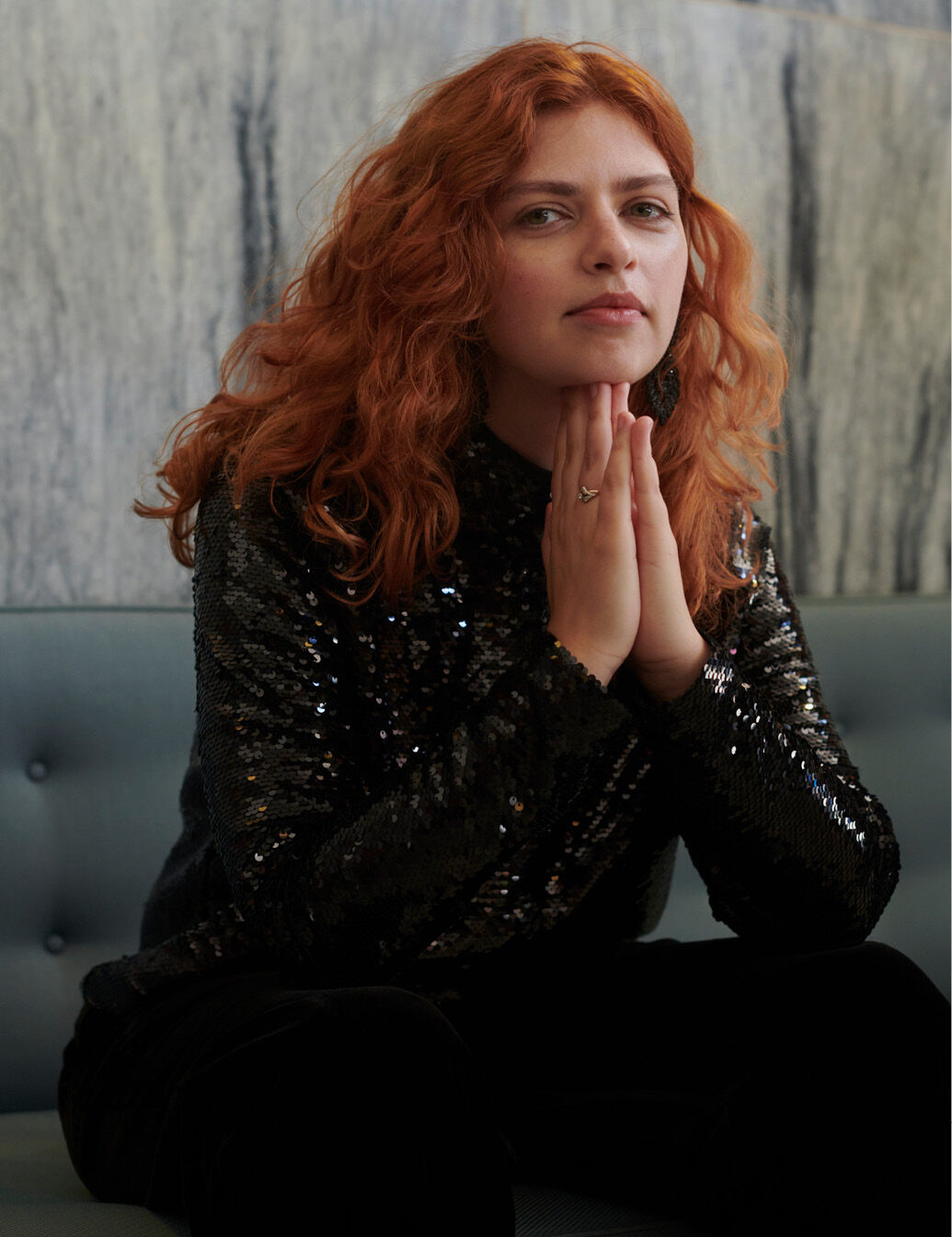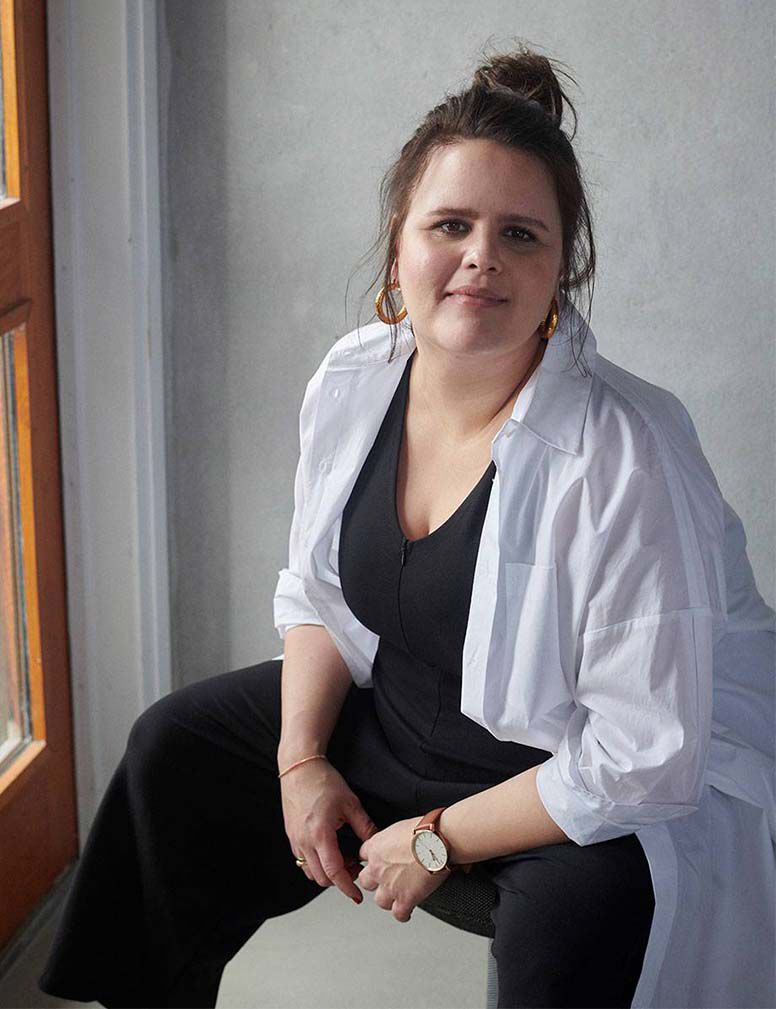Mille Bang is studying theology and she believes that the love of God is what unites us all. Faith is the backbone of her life, and by applying Kierkegaard’s philosophy, she is able to put Christianity into a modern context that tackles everything from social media to the art of loving others.
MILLE BANG
October 2020
Theology student



There is an Astrid Lindgren story I love about Emil from Lønneberg. Emil has been up to no good and is hiding on top of the workshop roof, his face covered in muck. His best friend Alfred shouts up to him: "Jump into my arms, I'll be here to catch you." To me, this is an image that conveys faith in God, because even if you've been up to no good and are covered in muck then God is there for you, just like Alfred, with arms out wide telling you, go ahead and jump, I'll be there to catch you. When Emil comes down from the roof, the pair head off into the twilight for a swim in the lake, and Emil says to Alfred: just you and me, Alfred, and Alfred says: just you and me Emil. I think that's a great reflection of what faith is. It reflects that there’s something greater out there to catch you if you fall. It’s a nice thing to have in this perfectionist and performance-based culture that we currently live in. It’s nice to have a faith, a church, Christianity and theology telling you that you’re already loved just as you are. Kierkegaard says that love is embedded in every person and that you need to see that love in others, and to look at others with love. You could say that what he means is that we have another person's life in our sights. He says we need to see the love in the other person, and to see them with love. That's what faith can do because it's not about being the best at anything. Faith is about being loved exactly as you are.
Faith came to me quite young, when I was 12-13 years old, attending church for the first time. I heard the vicar preach about faith, hope and love, doubt and all those other big themes. I think I thought that the church was a place for the big emotions in our lives, and where I was allowed to ask big questions. Why are we even here? What does it mean to be human? What does it mean to take responsibility and what does it mean to love thy neighbor, and who is your neighbor anyway? I didn’t always get answers to all my questions in church, but I felt I had a space where I could ask them. I’d go there to listen to readings, sing some hymns and spend time with people who I shared something with. I don't always leave the church with even greater faith, it's just a nice place to let go of all those things you have on your mind and stress about - to have somewhere to put them.



Faith is in many ways the backbone of my life, sometimes it's just there in the background, and I don't even think about it, and other times it takes up a lot of space. Faith is a bit like a pair of glasses you put on to see the world better, and sometimes you forget you have them on, and other times you can't remember where you put them. But it comes in waves, and then I go to church and it all makes so much sense, and I think to myself, why don't I do this more often?
When you look at the world from both the inside and outside, as I do myself, I notice so many people suffering from stress. It's hard being on social media and living up to all those demands, having a picture-perfect life, having to match and measure yourself against all those things that you believe the others have. Kierkegaard calls this 'comparison's disturbing thought', because the moment you focus purely on your own life, you realise things are going quite well, and the moment you compare yourself to others, that thought becomes disturbing, and you start to wonder who you are and whether you're good enough. I believe this is a very common thought process in our culture today, that we compare ourselves a lot. Everything is about being efficient and performing well. I think that the church can offer a space where this kind of thinking isn’t in focus. Instead the focus is on relationships and compassion, and about having faith in something greater with a different purpose. Remember that love is greater than anything else. It's what binds us together; and not only with those who are like us, but across genders, cultures and religions. I think it's a really important and beautiful thing to remember.
I love Søren Kierkegaard, and one of the things he is able to do is to translate Christian concepts into psychological terms. So instead of talking about sin, he talks of despair and anxiety, and is therefore relevant to our lives today. It can be quite alienating going to church and feeling that it's got nothing to do with you. Kierkegaard is able to talk to us in a way that makes us feel seen and recognised. He writes under pseudonyms, and he does this so that he can write directly to the individual, so it's not about thinking the same as Søren Kierkegaard. You need to be able to make your own decisions, and I think this is really clever. You can't just adopt his opinion, you need to address your own life and you need to choose yourself and become the 'self' you were meant to be.



The main message of Christianity is the double charity commandment, also reflected in the cross. It’s the idea that we should love vertically - so love God, and horizontally, to love our neighbor. That's what the cross can also symbolize. The charity commandment is built around what you MUST love, and there is a paradox here in that you must love because today we associate loving someone with feeling - I feel I love you. But falling in love, the idea of loving and loving someone in a relationship is built around some kind of criteria that means I may love someone more than others. On the other hand, Kierkegaard says that charity is built around the obligation to love, that you must love. Similarly, when he refers to loving a deceased, he says that you must grieve because grief is love. Grief is just love that has become homeless. And it’s important to keep grieving because this means you keep loving the person who is no longer in the world. They’re just in a different place.
I once read an article from a vicar about how many people didn't listen properly in church when they got married. Often, all they hear is for better, better and better, not for better and worse and idleness. Because love isn't just sunny holidays in Thailand with happy kids, love is also for worse and for idleness - now and again - and that's ok. This is where I think the church has a role to play (for modern love and marriage) because the language of the church is a good one to use when talking about loving another person. Loving another person is about loving the whole person, the person who can also be really annoying and difficult at times and who offers us both the better and the worse – just as you equally will offer another person, not just the better but also the worse. The love we talk about in church is also God's love for us, and that’s the greatest love there is, so when Paul talks about the greatest love of all, it's not human love, it's God's love of people. It's the love we are duty-bound to give to other people; families, children, siblings and friends on the one hand, but also our neighbor, who could be anyone. It could be someone we don't love or who we struggle to love. The bible talks of loving your enemy, which is almost impossible, but that's what it says. I think it would make the world a better place.
I think you can meet a glimpse of God in other people, or you can find something divine in others, which is probably because we have been created in God's image, and because we all have compassion and are equal, worthy people. I have a friend who says she's an atheist, but I think of her as a model Christian because she always puts others before herself, and she's a good and decent person. I believe that I sense a glimpse of God in her. I don’t believe that God is a Father Christmas figure sitting far away on a cloud but instead that God exists among us today as the Holy Spirit, as love, as the love that other people have and are, and give to one another.
MASAI STORIES er portretter som omhandler kvinneliv gjennom tanker og refleksjoner fra engasjerte og lidenskapelige kvinner. Historiene handler om diversitet, åpenhet, om mot og ikke minst om friheten til å være- og velge seg selv. Gjennom møtet med forskjellige kvinner, som inspirerer oss med sine livsvalg og kreativitet, ønsker vi å skape et unikt innblikk i kvinners univers. Slik viser vi skjønnheten og styrken som oppstår når lidenskap får mulighet til å utfolde seg, og når man velger å lytte til seg selv og gjøre det man drømmer om.



